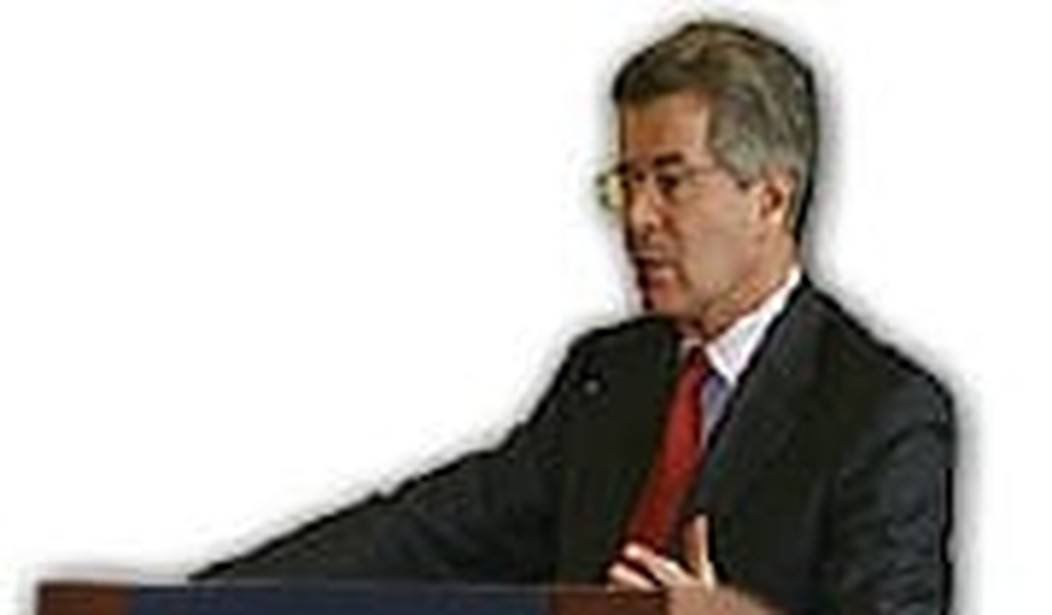The energetic French presidential race concluded yesterday with the election of moderate conservative Nicolas Sarkozy. But even as Sarkozy reaffirms France’s close relationship with the United States, the French will continue in their role as a diplomatic counterweight by reminding the U.S. of the challenges to be faced in the likely multi-polar world of the future.
The French position that such a world will need global rules and institutions to defend and promote our shared values was delivered Friday by French Ambassador Jean-David Levitte in a speech to the Chicago Council on Foreign Relations. In it he laid out the current challenges facing Europe and the United States: the Middle East, global warming, and the emerging economic superpower status of China and India.
As Levitte discussed each issue he applied the need for global institutions and rules that must be recognized and adhered to by every nation. A none-too-subtle hint at the outspoken unilateral tendencies of the current Bush administration.
Levitte said it was time to stop debating the legitimacy of the Iraq war, and focus on solutions to the problems faced in the region.
“You cannot impose democracy through the use of force. Democracy has to come from within,” he said.
He suggested that five years ago there was only one Middle East conflict (Israeli-Palestinian), and now there are four. The Israel/Palestinian conflict, the Lebanese problems with Hezbollah and Syria, the war in Iraq, and Iran’s nuclear ambitions.
Levitte continued, “[They are] all different but there is a kind of glue between all of them, and this glue has a name, Iran. Because Iran is helping Hamas in the Palestinian territories, financing and equipping Hezbollah in Lebanon, and supporting Syria and financing and supporting the Shia militia in Iraq. So it is important to see each of these crises are interconnected, and each time we make progress on one it has a positive ripple effect on the other three.”
The ambassador tackled the subject of the rapid growth of China and India as economic hyper-powers succinctly, and suggested the U.S. Congress’s desire to impose trade sanctions on these nations will trigger a commercial war that would not be helpful to anyone. To the contrary, Levitte described an optimistic view of the Chinese and Indian economic power shift:
“We are already in a kind of transition in China… Today [China] has a huge competitive edge. Most Chinese are working, and hard, because they have very few retirees and children. But in twenty years the situation will be totally different. Their baby boom happened a little later than ours, but in the next twenty years they will have a massive movement to retire. Hundreds of millions of Chinese shall retire and China has destroyed the health system and pension system which existed during the days of the domination of the communist party. They have to reinvent a new pension system and health system, but they have to pay for it, and this will diminish their competitive edge. All of this is on the shoulders of their one-child policy. Four grandparents retired, two parents on their way to retirement, and one child to pay for all of that! Add the cost of their cleaning their environment, their air and water, [which] will be very costly too. [sic]
“Yes, of course we still have to survive during the next 20 years, but the United States has no unemployment (per se) compared with France. France will not tackle the economic threat of China by cutting trade with China, but by economic reforms.”
Levitte was more pointed in his scorn of perceived U.S. procrastination on the subject of global warming:
“The U.S. may discuss global warming, but in Europe we think it is already there. Global warming is not the future, it is the present.
“All these global problems will only be solved if we have rules accepted by everybody. For Europe this means institutions, global institutions like the U.N., WTO. In a globalized world you need global rules.
“The U.S. may say, ‘We don’t fear the rules of the jungle as we are the 400lb gorilla.’ If you are the only superpower left in the world why should you accept rules? The U.S. should impose the rules. This is good today, but think of tomorrow – in 20 years – you will be the 500lb gorilla, but maybe China will be the 800 pound gorilla and India the 600 pound gorilla, and you may regret at that time not having good institutions and rules respected by all key actors.”
The European Union will celebrate, next month, the 60th anniversary of the Marshall Plan that rebuilt Europe after the Second World War, and helped create the European Union.
Levitte concluded the speech by reaffirming the common goals of Europe and the U.S., “Let’s work together to defend and promote the values of democracy, freedom, liberty.”
Richard Buchanan blogs at The Opinionist









Join the conversation as a VIP Member